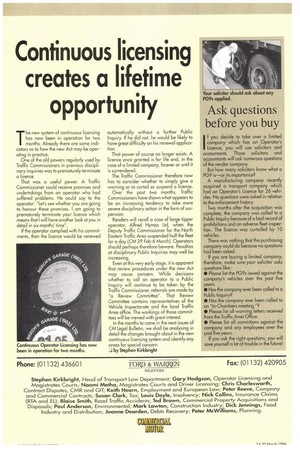Continuous licensing creates a lifetime opportunity
Page 60

If you've noticed an error in this article please click here to report it so we can fix it.
The new system of continuous licensing has now been in operation for two months. Already there are some indicators as to how the new Ad may be operating in practice.
One of the old powers regularly used by Traffic Commissioners in previous disciplinary inquiries was to prematurely terminate a licence.
That was a useful power. A Traffic Commissioner could receive promises and undertakings from an operator who had suffered problems. He could say to the operator: "Let's see whether you are going to honour these promises. I am going to prematurely terminate your licence which means that I will have another look at you in detail in six months' time".
lithe operator complied with his commitments, then the licence would be renewed automatically without a further Public Inquiry. If he did not, he would be likely to have great difficulty on his renewal application.
That power of course no longer exists. A licence once granted is for life and, in the case of a limited company, forever or until it is surrendered.
The Traffic Commissioner therefore now has to consider whether to simply give a warning or to curtail or suspend a licence. Over the past two months, Traffic Commissioners have shown what appears to be an increasing tendency to take more severe disciplinary action in the form of suspension. Readers will recall a case of large tipper operator, Alfred Hymas Ltd, when the Deputy Traffic Commissioner for the North Eastern Traffic Area suspended half the fleet for a day (CM 29 Feb-6 March). Operators should perhaps therefore beware. Penalties at disciplinary Public Inquiries may well be increasing.
Even at this very early stage, it is apparent that review procedures under the new Act may cause concern. While decisions whether to call an operator to a Public Inquiry will continue to be taken by the Traffic Commissioner, referrals are made by "a Review Committee". That Review Committee contains representatives of the Vehicle Inspectorate and the local Traffic Area office. The workings of those committees will be viewed with great interest. In the months to come in the next issues of CM Legal Bulletin, we shall be analysing in detail the changes brought about in the new continuous licensing system and identify any areas for special concern.
J by Stephen Kirkbright
































































































































